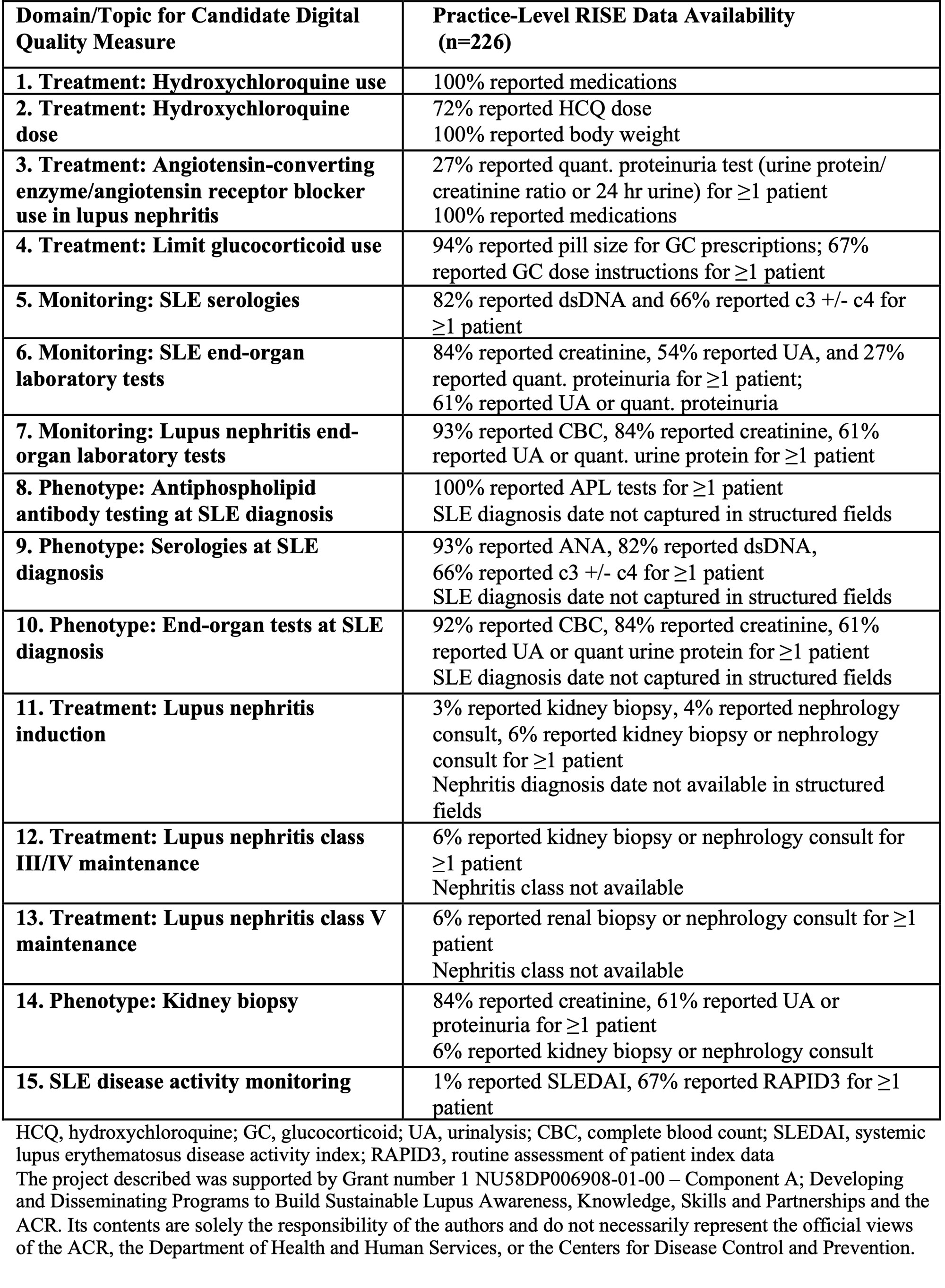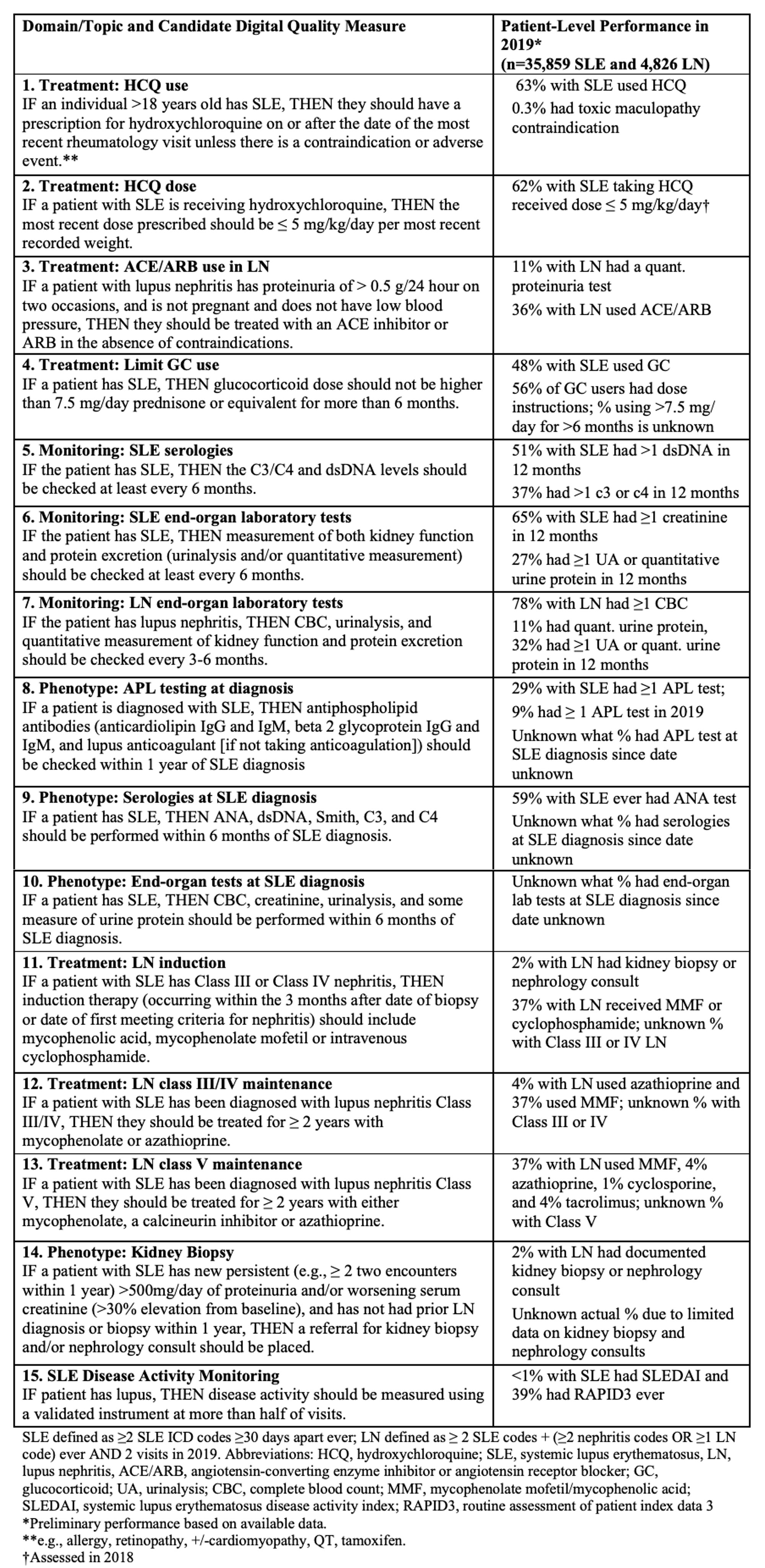Session Information
Session Type: Poster Session C
Session Time: 1:00PM-3:00PM
Background/Purpose: Digital quality measures can facilitate monitoring and improvement of health care quality on a population level. As part of a CDC-funded ACR initiative to develop digital quality measures for systemic lupus erythematosus (SLE) care, we aimed to assess the data availability and preliminary patient-level performance for 15 candidate measures using contemporary electronic health record (EHR) data from the ACR RISE Registry.
Methods: RISE is a national registry that collects EHR data from rheumatology practices across the United States. We identified all participating RISE practices and identified patients who met SLE criteria (e.g., ≥2 ICD codes for SLE ≥30 days apart), were ≥18 years of age, and had ≥2 visits in 2019. We also identified all patients with lupus nephritis (LN) who met above criteria and had ≥1 LN code (ICD-10 M32.14) OR ≥2 nephritis codes (Chibnik 2010). An expert panel generated 15 If/Then statements for candidate SLE quality measures (methods described separately). For each measure, we assessed the proportion of RISE practices with the relevant data available in structured EHR fields and the proportion of patients who would meet all or part of the candidate measures in 2019 per the available data.
Results: Across 226 practices in the RISE registry, we identified 35,859 patients with SLE and 4,826 patients with LN who had ≥2 visits in 2019 (Table 1). 91% with SLE and 86% with LN were female; mean ages were 55 and 52 years. 19% with SLE and 29% with LN were Black/African American. Over 70% of patients were seen in single-specialty rheumatology practices; the mean number of visits was 4.2. Practice-level data availability is shown in Table 2. Medication records were available for all RISE practices. The prescribed dose, required to assess candidate measures of safe dosing, was available in 73% of practices for hydroxychloroquine (HCQ) and 56% for glucocorticoids. Laboratory monitoring of dsDNA, complements, and urinalysis or quantitative urine protein were each available in over half of practices. Only 6% of practices had structured data available on kidney biopsy orders or nephrology consult orders. LN class and dates of SLE/LN diagnosis were not reported in structured EHR fields. Preliminary measure performance is shown in Table 3. HCQ use was documented for 63% of patients with SLE; 62% received HCQ dosing ≤5 mg/kg. Glucocorticoids were used by 48% with SLE in 2019, but the daily dose for a 6-month period was challenging to discern from available data. For end-organ monitoring, 27% of patients with SLE and 32% with LN had ≥1 urinalysis or quantitative urine protein in 2019. Fewer than 1% of patients had any SLEDAI scores reported.
Conclusion: Using the ACR RISE registry, we assessed the data availability and preliminary performance for 15 candidate digital quality measures. Key medication dosing and targeted monitoring labs were captured by most RISE practices and identified potential gaps in individual SLE patient care. Measures based on incident SLE or LN class are limited by data availability. Next steps include a Delphi exercise to rate the candidate SLE digital quality measures by importance and feasibility. The top-ranked measures will undergo a detailed assessment of validity and feasibility in RISE practices.
To cite this abstract in AMA style:
Jorge A, Aguirre A, Barnado A, Bermas B, Feldman C, Jatwani S, Limanni A, Zell J, Barber C, Duarte-Garcia A, Garg S, Li J, Schmajuk G, Yazdany J, Bartels C. Development of ACR Longitudinal Digital Quality Measures for Systemic Lupus Erythematosus: Data Availability and Preliminary Measure Performance in the RISE Registry [abstract]. Arthritis Rheumatol. 2022; 74 (suppl 9). https://acrabstracts.org/abstract/development-of-acr-longitudinal-digital-quality-measures-for-systemic-lupus-erythematosus-data-availability-and-preliminary-measure-performance-in-the-rise-registry/. Accessed .« Back to ACR Convergence 2022
ACR Meeting Abstracts - https://acrabstracts.org/abstract/development-of-acr-longitudinal-digital-quality-measures-for-systemic-lupus-erythematosus-data-availability-and-preliminary-measure-performance-in-the-rise-registry/



